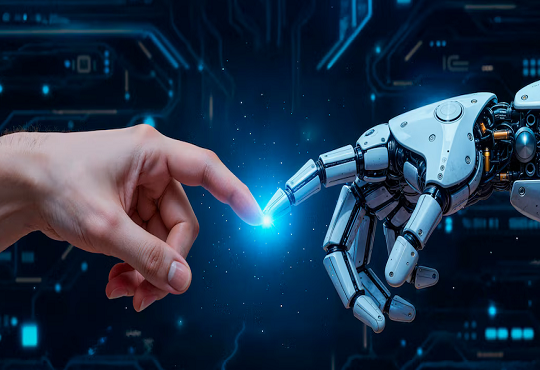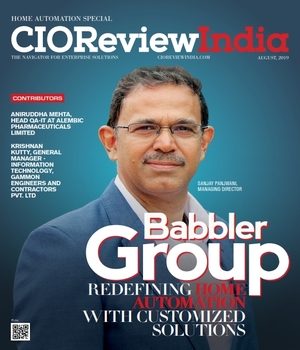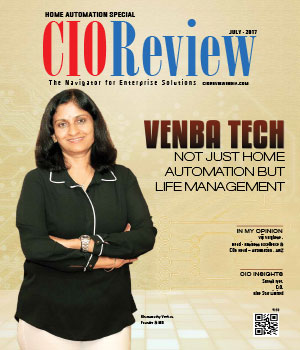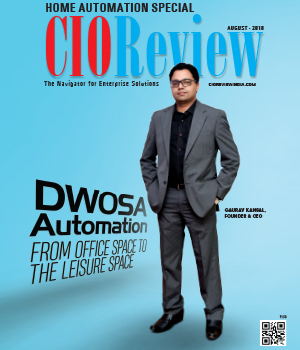
How Can IoT Help in Transition from Legacy Enterprises to Cutting-Edge Manufacturing Units?
Samir Yajnik, President- Global Delivery & COO APAC, Tata Technologies
 Q. IoT has already set in motion the idea of a fourth industrial revolution- a new wave of technological changes that will decentralize production control and trigger a paradigm shift in manufacturing. What major impacts will IoT have on the manufacturing sector in the years to come?
Q. IoT has already set in motion the idea of a fourth industrial revolution- a new wave of technological changes that will decentralize production control and trigger a paradigm shift in manufacturing. What major impacts will IoT have on the manufacturing sector in the years to come?
The manufacturing landscape has been undergoing constant evolution with advances in technology. The all-pervasive digital disruption has not only altered and simplified the process of manufacturing but has also made the work itself smarter.
‘Intelligence is virtually anything and everything’ is the phenomenon that is slowly but steadily extending its sway over manufacturing. Internet of Things (IoT) has opened a host of opportunities by bringing together the physical and virtual world. In product design, for instance, manufacturers typically develop and design products with a clear-cut idea of usage context and process. But once the product goes into the hands of the consumer, they have little control over how they choose to use the product on their own. Being able to track live usage and performance can have innumerable applications when it comes to product design. Apart from its regular uses, such as in anticipating maintenance schedules, performance improvement and more, IoT can also help manufacturers understand the real-world usage of their products and streamline features accordingly. Apart from streamlining processes, it holds immense potential to rejuvenate internal efficiency. With the use of virtual production system, for instance, IoT can help to track real-time production activities, perform scheduled changes, initiate predictive maintenance, trigger timely alerts, launch new programs and even introduce model change overs. With the fall in prices of standard equipment for industries; individual stores of information in manufacturing units, so far untapped, can now be harnessed to develop both deep and overarching insights into the production system. If implemented, IoT has the potential to transform all aspects of manufacturing, right from engineering and design, to Enterprise Resource Planning (ERP), product development, Manufacturing Execution Systems (MES) and Product Lifecycle Management (PLM).
Q. In manufacturing, the potential for cyber-physical systems to improve productivity in the production process and the supply chain is vast. Such technologies- where smart products can take corrective action to avoid damages and where individual parts are automatically replenished- already exist. What is stopping companies to leverage the technologies? What opportunities and challenges lay ahead for manufacturers and what will it take to win?
Connected enterprises employing smart devices have found a greater degree of efficiency in the process of manufacturing. Disruptive advances like IoT can help in creating a value chain that is “intelligent”. An often overlooked aspect of IoT enabled manufacturing is the degree of transparency, accountability and feedback that emerges from detailed insights into factory operations. With operational resiliency at the forefront of supply chain strategies, there can be no place for ‘blind spots’.
While the deployment of IoT by manufacturers is gaining momentum, there still are companies who are reluctant about adopting the technology. This is primarily due to lack of awareness and information, coupled with poor infrastructure. Some other factors hindering overall implementation of IoT include supply chain concerns, security and privacy. With absorption of embedded systems in manufacturing, maintenance of integrity in the supply chain will be a key focus area for manufacturers. Enterprises have also expressed concern regarding the security and privacy for connected devices as they are controlled and navigated through network communication. In any case, there is always a solution and it is up to the industries to take requisite steps to benefit from IoT.
Q. The lack of industry standards and well-defined best practices of IoT regarding connectivity, data storage, and even security presents substantial challenges to manufacturers as they ramp up their investments. There is no off-the-shelf package that integrates, maintains, manages and services all of the technologies required. What do you think can be done and what are the advancements by Tata Technologies in this area?
Companies like Tata Technologies are already offering solutions to help businesses transition from legacy enterprises to cutting-edge, manufacturing units. Through deep domain expertise, their service offerings helps nurture every step from the moment a customer places an order till its fulfillment, in order to best optimize operational efficiencies and business processes for its clients.
The emergence and rise of IoT, coupled with other advances in embedded technology, big data and omnipresent connectivity, cyber-physical systems are becoming a reality for industries. These technologies have converged to form a meaningful spiral in manufacturing and have lent a fillip to industry leaders towards Digital Factories. With the kind of experience and expertise in this segment, Tata Technologies aspires to lead the way in defining this space and help its customers in their journey to digital transformation.
CIO Viewpoint
National Technology Day 2025: Powering Progress...
By CIOTech Outlook Team
Aligning IT Roadmap with Business Objectives: A...
By Subhash singh Punjabi, CISO & Head Enterprise Architecture, Deepak Fertilisers & Petrochemicals Corporation Ltd
Empowering Women: Shaping the Future of Industry
By CIOTechOutlook Team
CXO Insights
Home Owners Can Look Forward To Futuristic Home...
By Avnish Mehta, Director - Digital Transformation at CollaberaInc
Empowering Mobile Network Operators With...
By Christos Karmis, President & CEO, Mobilitie
Smart Homes: Changing The Way We Live







